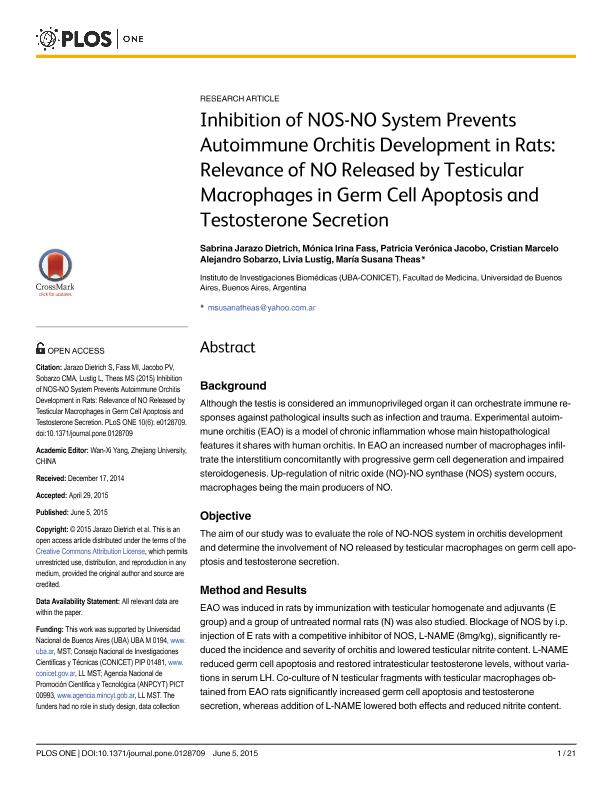Artículo
Inhibition of NOS-NO system prevents autoimmune orchitis development in rats: relevance of no released by testicular macrophages in germ cell apoptosis and testosterone secretion
Jarazo Dietrich, Sabrina Soledad ; Fass, Mónica Irina
; Fass, Mónica Irina ; Jacobo, Patricia Verónica
; Jacobo, Patricia Verónica ; Sobarzo, Cristian Marcelo Alejandro; Lustig, Livia
; Sobarzo, Cristian Marcelo Alejandro; Lustig, Livia ; Theas, Maria Susana
; Theas, Maria Susana
 ; Fass, Mónica Irina
; Fass, Mónica Irina ; Jacobo, Patricia Verónica
; Jacobo, Patricia Verónica ; Sobarzo, Cristian Marcelo Alejandro; Lustig, Livia
; Sobarzo, Cristian Marcelo Alejandro; Lustig, Livia ; Theas, Maria Susana
; Theas, Maria Susana
Fecha de publicación:
06/2015
Editorial:
Public Library of Science
Revista:
Plos One
ISSN:
1932-6203
Idioma:
Inglés
Tipo de recurso:
Artículo publicado
Clasificación temática:
Resumen
Background: Although the testis is considered an immunoprivileged organ it can orchestrate immune responses against pathological insults such as infection and trauma. Experimental autoimmune orchitis (EAO) is a model of chronic inflammation whose main histopathological features it shares with human orchitis. In EAO an increased number of macrophages infiltrate the interstitium concomitantly with progressive germ cell degeneration and impaired steroidogenesis. Up-regulation of nitric oxide (NO)-NO synthase (NOS) system occurs, macrophages being the main producers of NO. Objective: The aim of our study was to evaluate the role of NO-NOS system in orchitis development and determine the involvement of NO released by testicular macrophages on germ cell apoptosis and testosterone secretion. Method and Results: EAO was induced in rats by immunization with testicular homogenate and adjuvants (E group) and a group of untreated normal rats (N) was also studied. Blockage of NOS by i.p. injection of E rats with a competitive inhibitor of NOS, L-NAME (8mg/kg), significantly reduced the incidence and severity of orchitis and lowered testicular nitrite content. L-NAME reduced germ cell apoptosis and restored intratesticular testosterone levels, without variations in serum LH. Co-culture of N testicular fragments with testicular macrophages obtained from EAO rats significantly increased germ cell apoptosis and testosterone secretion, whereas addition of L-NAME lowered both effects and reduced nitrite content. Incubation of testicular fragments from N rats with a NO donor DETA-NOnoate (DETA-NO) induced germ cell apoptosis through external and internal apoptotic pathways, an effect prevented by N-acetyl-L-cysteine (NAC). DETA-NO inhibited testosterone released from Leydig cells, whereas NAC (from 2.5 to 15 mM) did not prevent this effect. Conclusions: We demonstrated that NO-NOS system is involved in the impairment of testicular function in orchitis. NO secreted mainly by testicular macrophages could promote oxidative stress inducing ST damage and interfering in Leydig cell function.
Palabras clave:
Autoimmune Orchitis
,
Testis
,
Nos-No System
,
Testosterone
Archivos asociados
Licencia
Identificadores
Colecciones
Articulos(BIOMED)
Articulos de INSTITUTO DE INVESTIGACIONES BIOMEDICAS
Articulos de INSTITUTO DE INVESTIGACIONES BIOMEDICAS
Articulos(INBIOMED)
Articulos de INSTITUTO DE INVESTIGACIONES BIOMEDICAS
Articulos de INSTITUTO DE INVESTIGACIONES BIOMEDICAS
Citación
Jarazo Dietrich, Sabrina Soledad; Fass, Mónica Irina; Jacobo, Patricia Verónica; Sobarzo, Cristian Marcelo Alejandro; Lustig, Livia; et al.; Inhibition of NOS-NO system prevents autoimmune orchitis development in rats: relevance of no released by testicular macrophages in germ cell apoptosis and testosterone secretion; Public Library of Science; Plos One; 10; 6; 6-2015; e0128709
Compartir
Altmétricas



